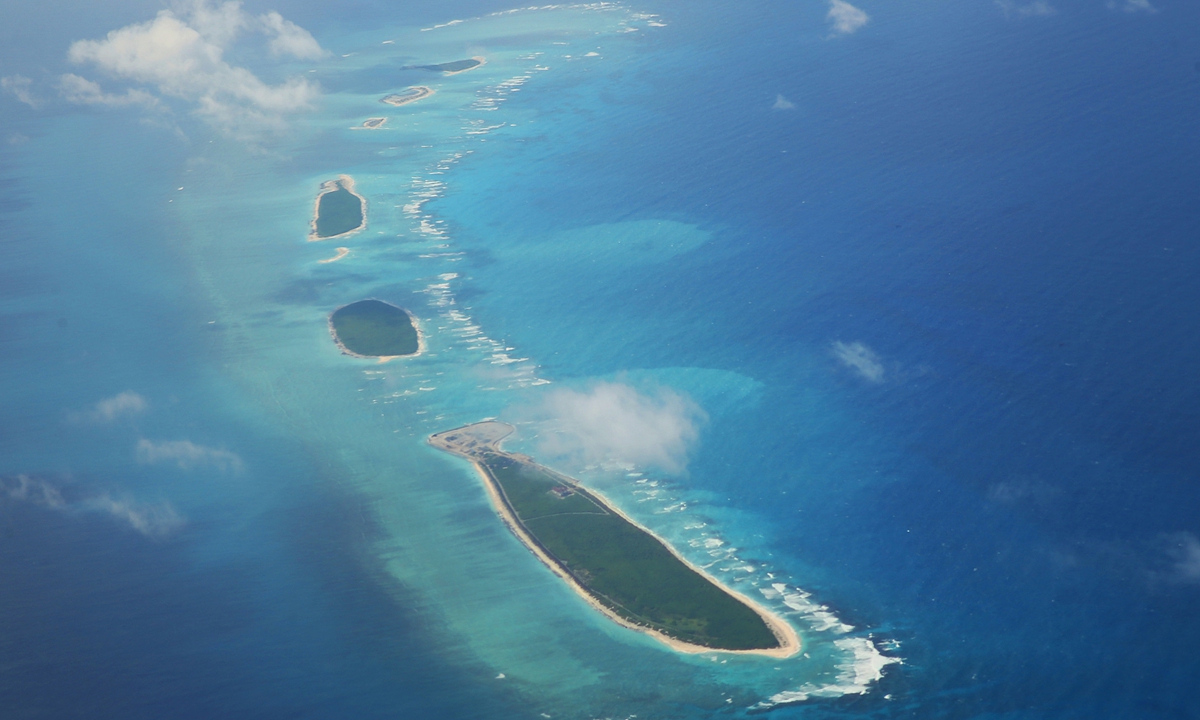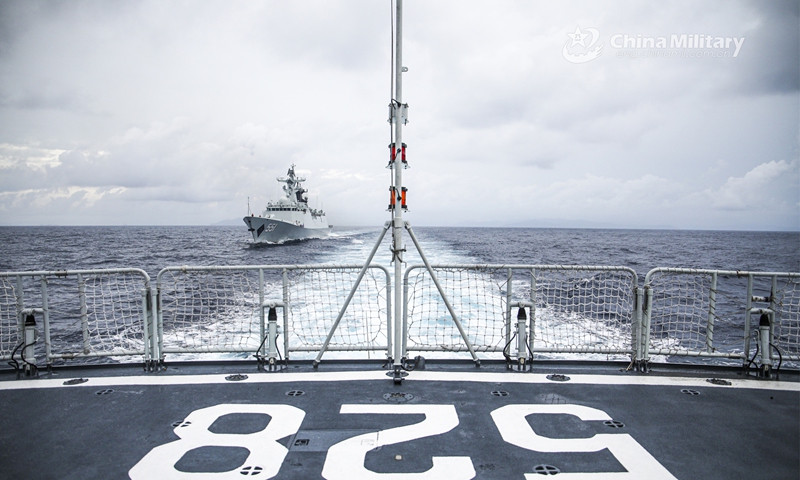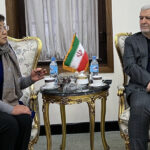The Chinese People’s Liberation Army (PLA) extended its two-day routine patrol in the South China Sea into a third day of joint exercises on Friday, in a move experts said displayed China’s determination and capability in safeguarding national sovereign security and maritime rights, as the US and the Philippines reportedly scaled down their joint patrol in the region.
The PLA Southern Theater Command on Friday organized a regular maritime, aerial joint exercise in waters in the South China Sea, the PLA Southern Theater Command said in a press release on Friday.
It closely followed a two-day regular patrol by naval and air forces of the PLA Southern Theater Command in the South China Sea from Wednesday to Thursday, when the command vowed to have its troops on high alert to resolutely safeguard national sovereign security and maritime rights, and bring any military activity that upset the situation or create tension in the region under control.
At the same time as the Chinese patrol, the Philippines and the US also conducted a two-day joint patrol in the South China Sea from Wednesday to Thursday, the second such operation held between the two countries since November last year and which was scheduled to see the participation of four Philippine naval vessels and four US warships including an aircraft carrier, according to a Wednesday report by Reuters.
Chen Xiangmiao, director of the World Navy Research Center at the National Institute for South China Sea Studies, told the Global Times on Friday that the PLA Southern Theater Command’s joint exercise is a routine one not targeted at any specific event or a third country.
Through the exercise, the PLA forces can test the performance of its weapons and systems, enhance the troops’ operational capabilities, increase the interoperability among different military services and branches, as well as get a better understanding of the combat environment, Chen said.
While the PLA conducts such normal operations in the region regularly, it does not always publicize them, Chen said, noting that the purpose of publicizing this exercise is to display the Chinese military’s determination and capability in safeguarding its rights and interests in the South China Sea.
Song Zhongping, a Chinese military expert and TV commentator, told the Global Times on Friday that China is unequivocal when it comes to safeguarding its national sovereign security and development interests.
“We need to bolster management and control over our sovereign territories through law enforcement and military operations,” Song said.
Experts said that the US has been inciting the Philippines to provoke China over islands and reefs in the South China Sea, and the PLA’s announcement of the exercise to enhance combat preparedness in the South China Sea should also be viewed against this background.
Under the guise of humanitarian resupplies, the Philippines has repeatedly sent vessels carrying illegal building materials in attempts to reinforce a warship that has been illegally grounded on Ren’ai Jiao (also known as Ren’ai Reef) since 1999 in order to permanently occupy the Chinese reef, breaking its promise made to China that it would tow away the ship.
Those attempts were blocked by China Coast Guard (CCG) vessels using legitimate and professional restriction measures.

South China Sea Photo: VCG
Scaling down
While the joint patrol by the Philippines and the US was scheduled to be a large-scale one, the actual operation was seen as scaling down significantly.
Analysts said that the US’ scaling down of the operation was likely because of seeing China’s determination and capability, since a military conflict with China does not benefit US interests, and it is in the best interest of the Philippines to return to the path of resolving the dispute through dialogue.
The Philippine Daily Inquirer reported on Thursday that the Philippines-US “maritime cooperative activity” was supposed to run from Tuesday to Thursday, but it was delayed for 24 hours due to “operation requirements” from the US side.
Then on Wednesday, only one US destroyer arrived, with two other US warships and the USS Carl Vinson aircraft carrier not showing up due to “operational necessity,” while a scheduled photo exercise and gunnery exercises were also canceled, the Philippine Daily Inquirer reported, noting that the Philippine and US Navy warships were shadowed by a frigate and a destroyer from China.
The USS Carl Vinson showed up on Thursday, when it hosted a visitor embark for the armed forces of the Philippines, according to the Pentagon’s Defense Visual Information Distribution Service.
Song said that the US wants the Philippines to be a proxy in containing China, but does not want to fight for the Philippines.
The US knows that there are no benefits to have a military conflict in the South China Sea with China, and that is why it backed down, Song said, noting that the US only takes its own interests into consideration, while its ally’s interests are expendable.
The assumption that the US could fight China in the South China Sea for the Philippines does not stand, as it is a tacit understanding that a war between China and the US would likely not be just a regional war, but likely an all-out conflict that could become a destructive one that is unbearable by the whole world, experts said.
China is always devoted to safeguarding regional peace and stability, and has been exercising restraint in managing and controlling maritime disputes, another Chinese military expert who requested anonymity told the Global Times on Friday.
The CCG’s restriction measures taken against the Philippines’ trespassing vessels as well as the PLA’s patrols and drills are restrained moves aimed at safeguarding national sovereign security and maritime rights, and they also made China’s determination and capability clear to the trouble-stirring forces, so as to avoid misjudgment, misunderstanding and accidents, the expert said.
“China is a peace-loving country, but no matter who the opponent is, China will resolutely safeguard its national sovereignty, territorial integrity and development interests,” the expert said, urging the Philippines to return to talks to resolve the dispute.
The Philippines has no choice but to return to the track of dialogue after its provocations failed to come to fruition, Yuyuan Tantian, a social media account affiliated with China Central Television, said on Friday, citing an anonymous source.
China is always committed to resolving differences through dialogue and consultation and making joint efforts to maintain maritime stability, but we will not turn a blind eye to the Philippines’ repeated provocations and harassment, said Senior Colonel Wu Qian, a spokesperson of China’s Ministry of National Defense, at a regular press conference on December 28.













